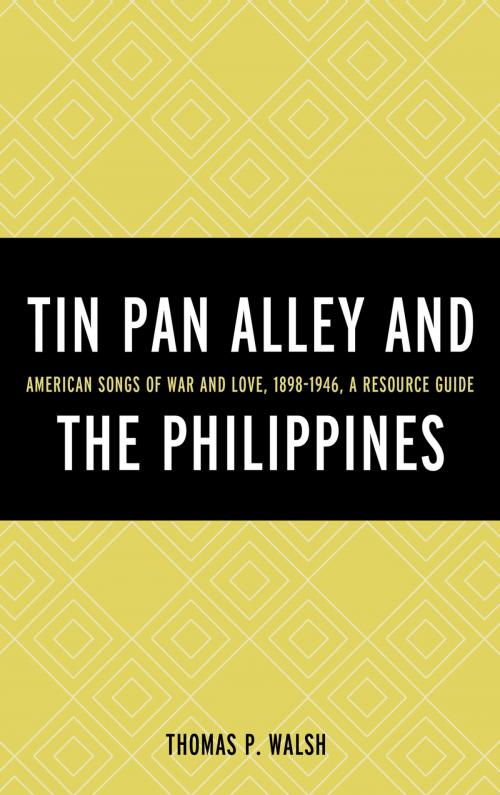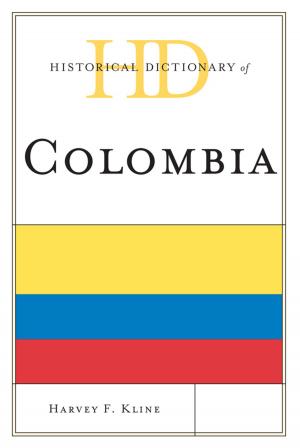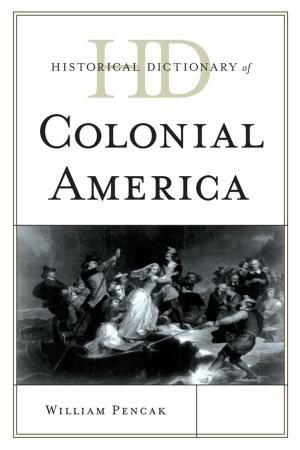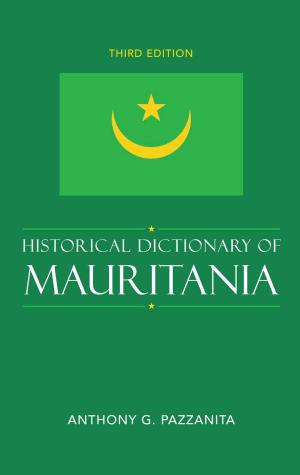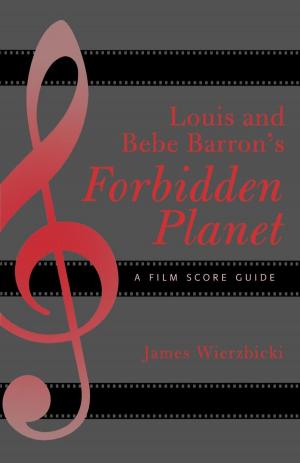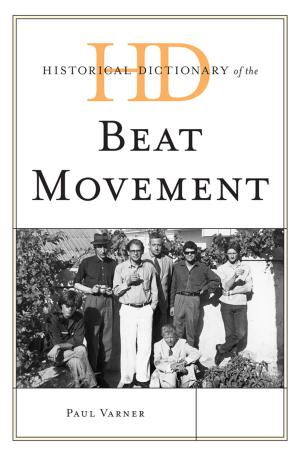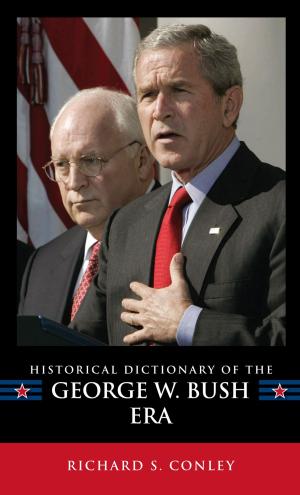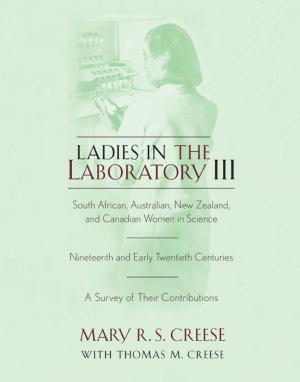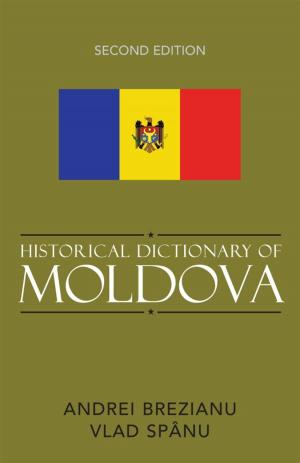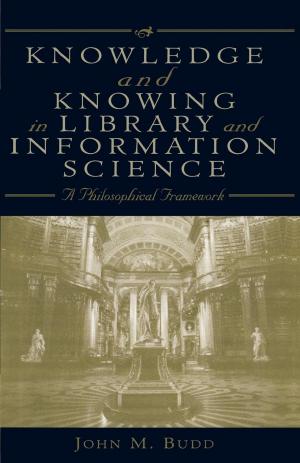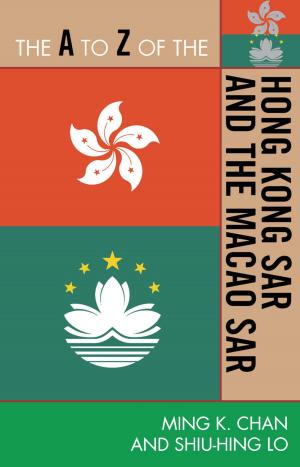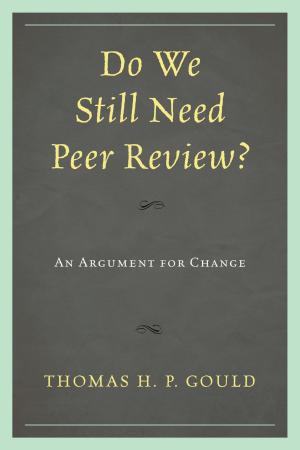Tin Pan Alley and the Philippines
American Songs of War And Love, 1898-1946, A Resource Guide
Nonfiction, Entertainment, Music, Theory & Criticism, Ethnomusicology| Author: | Thomas P. Walsh | ISBN: | 9780810886094 |
| Publisher: | Scarecrow Press | Publication: | April 4, 2013 |
| Imprint: | Scarecrow Press | Language: | English |
| Author: | Thomas P. Walsh |
| ISBN: | 9780810886094 |
| Publisher: | Scarecrow Press |
| Publication: | April 4, 2013 |
| Imprint: | Scarecrow Press |
| Language: | English |
In this innovative resource guide, Thomas P. Walsh has compiled a unique collection of some 1,400 published and unpublished American musical compositions relating in some way to the Philippines during the American colonial era in the country from 1898 to 1946. In preparing the guide, Walsh surveyed a wide array of sources: published songs listed in WorldCat, the online catalogs of sheet music collections of university libraries and major public and private research libraries, bibliographic compilations of popular music, the periodical literature on music and popular culture, published collections of “soldier songs,” and sheet music listed for sale on commercial auction websites. In addition, for the first time in the preparation of a research bibliography, the guide also identifies, from song registrations in the US Copyright Office’s Catalog of Copyright Entries (CCE), 48 years of musical compositions relating to the Philippines. In systematically going through the CCE, year by year, Walsh discovered hundreds of unpublished songs written by average Americans expressing their varied views about historical events and their personal experiences relating to America’s distant colony in Southeast Asia.
Of the 1,400 chronologically-listed songs included in the guide, most will be new materials for scholars and students alike to study. Songs like “Ma Little Cebu Maid,” “My Own Manila Sue,” “My Fillipino Belle,” “Down on the Philippine Isles,” “Beside the Pasig River,” “My Philippino Pearl,” and “I Want a Filipino Man” were all published and widely promoted by Tin Pan Alley and were performed on stage and listened to at home on records and piano rolls across America. The lyrics often illustrate popular American attitudes, from shrilly patriotic numbers about the Battle of Manila Bay and, later, the Fall of Bataan and Corregidor to wistful, romantic, and even charming reminiscences of happy days spent in “old” Manila to racially charged pieces rife with deprecating stereotypes of Filipinos. This guide reprints a number of these hard-to-find song lyrics, making them available to readers for the first time in over a century. In addition to including the lyrics to a number of the songs, the guide also provides copyright registration numbers and dates of registration for many of the published and unpublished songs. Also provided are some 700 “notes” on particular songs and over 750 links that provide direct access to bibliographic records or even digital copies of the sheet music in libraries and collections.
Exhaustive in its scope, Tin Pan Alley and the Philippines is an invaluable research resource for scholars and students of American history, Pacific studies, popular culture, and ethnomusicology.
In this innovative resource guide, Thomas P. Walsh has compiled a unique collection of some 1,400 published and unpublished American musical compositions relating in some way to the Philippines during the American colonial era in the country from 1898 to 1946. In preparing the guide, Walsh surveyed a wide array of sources: published songs listed in WorldCat, the online catalogs of sheet music collections of university libraries and major public and private research libraries, bibliographic compilations of popular music, the periodical literature on music and popular culture, published collections of “soldier songs,” and sheet music listed for sale on commercial auction websites. In addition, for the first time in the preparation of a research bibliography, the guide also identifies, from song registrations in the US Copyright Office’s Catalog of Copyright Entries (CCE), 48 years of musical compositions relating to the Philippines. In systematically going through the CCE, year by year, Walsh discovered hundreds of unpublished songs written by average Americans expressing their varied views about historical events and their personal experiences relating to America’s distant colony in Southeast Asia.
Of the 1,400 chronologically-listed songs included in the guide, most will be new materials for scholars and students alike to study. Songs like “Ma Little Cebu Maid,” “My Own Manila Sue,” “My Fillipino Belle,” “Down on the Philippine Isles,” “Beside the Pasig River,” “My Philippino Pearl,” and “I Want a Filipino Man” were all published and widely promoted by Tin Pan Alley and were performed on stage and listened to at home on records and piano rolls across America. The lyrics often illustrate popular American attitudes, from shrilly patriotic numbers about the Battle of Manila Bay and, later, the Fall of Bataan and Corregidor to wistful, romantic, and even charming reminiscences of happy days spent in “old” Manila to racially charged pieces rife with deprecating stereotypes of Filipinos. This guide reprints a number of these hard-to-find song lyrics, making them available to readers for the first time in over a century. In addition to including the lyrics to a number of the songs, the guide also provides copyright registration numbers and dates of registration for many of the published and unpublished songs. Also provided are some 700 “notes” on particular songs and over 750 links that provide direct access to bibliographic records or even digital copies of the sheet music in libraries and collections.
Exhaustive in its scope, Tin Pan Alley and the Philippines is an invaluable research resource for scholars and students of American history, Pacific studies, popular culture, and ethnomusicology.
